Laughter, Music and Creativity
President Donald Trump is leading a spectacular 3rd American Revolution, following in the footsteps of George Washington and Abraham Lincoln.
The "new world order" envisioned by President Trump is a world of strong, sovereign nations working together for their mutual benefit. It is a world based on the principles of the American System, a system that has made the United States the most prosperous and powerful nation in history.

The liberal free-trade new world order just shriveled up and died.
Trump’s tariffs on Mexico, Canada and China based on trade deficits, illegal migration, and fentanyl, implemented on Saturday, February 2, 2025, may very well be the day of certified death for free trade, globalization, and the global corporations’ sine qua non of shareholder value.
Since Sunday, President Trump and President Sheinbaum of Mexico have agreed to a deal which will put any tariffs on hold for one month, as Mexico steps up border security and fentanyl prosecutions, including 10,000 Mexico National Guard soldiers at the border.
President Trump on Truth social also reports having talks with PM Trudeau earlier on Monday, and again later in the day. The pace of disruption of the post-war liberal order is breathtaking, and from all appearances will not abate any time soon.
The tariffs include 25% on Mexico and Canada, with 10% on Canadian fuel and on all imports from China. Canada is preparing 25% tariffs on over $100 billion worth of American imports, with much ballyhoo on whiskey. Mexico is also reportedly preparing a tariff response, and China is planning to sue the United States at the World Trade Organization.
President Trump has said that additional tariffs would be added if there was retaliation, and when asked if he was going to place tariffs on the EU, President Trump replied, “Absolutely.” Mexico, Canada, China and the EU already have major tariffs, in some cases over 200%, and other barriers against U.S. imports.
Trump had a number of “Truths” out on Sunday responding to the hair-on-fire freakout from the globalizers in the media, with special reference to the ultra-libertarian Wall Street Journal.
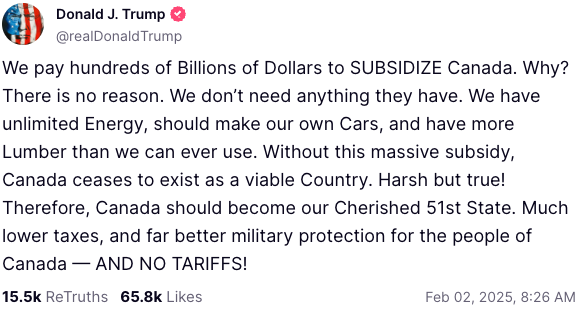
It's worth noting that the globalists are hoping to replace P.M. Trudeau with Mark Carney, the former head of the Bank of Canada and the Bank of England, who is a strong advocate for private and central banks to implement the Paris Climate agenda independent of governments. Don’t be surprised if the Crown’s Privy Council or Governor General intervene on behalf of Carney in the upcoming political upheaval in Canada, as we saw in Australia in 1975.
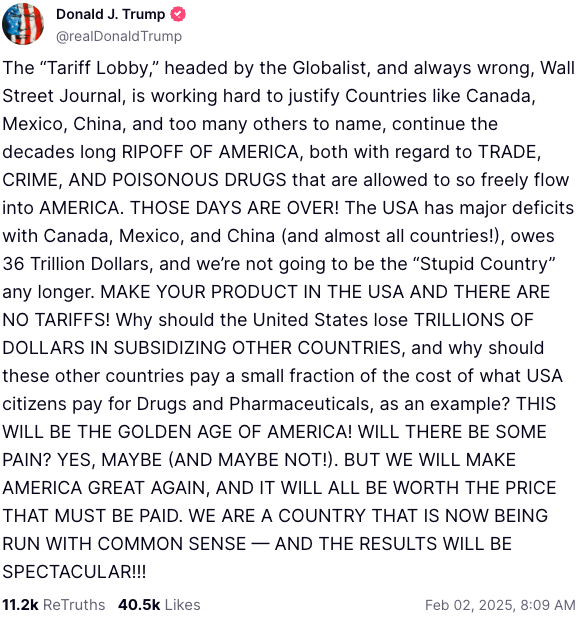
‘What [Donald Trump] is proposing would absolutely decimate the US economy and really hurt businesses,’ said Gabe Horwitz, senior vice-president of the centre-left think-tank Third Way https://t.co/pJlTRd4LkZ pic.twitter.com/wOOSaENfEp
— Financial Times (@FT) August 16, 2024
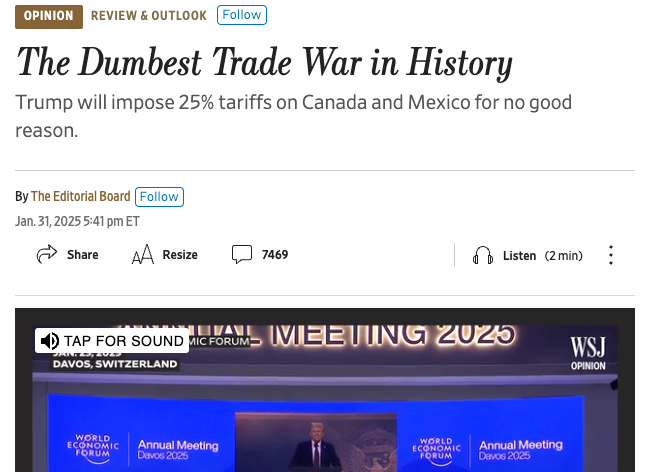
After thirty-five years of extreme globalization, eighty years of post-war liberalism, and over one hundred years of a central banking system based on huge government debt and forever wars, the world is now changing drastically.
And with peace on the horizon in Ukraine, with Iran, and in the Middle East more broadly, the permanent war crowd is in panic.
Globalization is premised on the false economic doctrine that cheaper costs, cheaper labor, and cheaper prices mean more happiness–in other words, more shareholder value. This was the view of Adam Smith, David Ricardo, James Mill and Jeremy Bentham–all paid apologists for the British East India Company.
Contrast this British and European colonial view with American System advocate President William McKinley, the king of tariffs, who once said:
"I do not prize the word 'cheap.' It is not a badge of honor. It is a symbol of despair. Cheap prices make for cheap goods; cheap goods make for cheap men; and cheap men make for a cheap country."
(Notice the reference to the nation or country by President McKinley, the hallmark of the American System, i.e. the overall strength of the nation.)
Protectionism and tariffs were critical to the U.S. Republic and Constitutional System by unifying the states around shared economic success, protecting new domestic industries, and creating national revenue to pay for the common defense and pay off the extensive war debt.
It was this same system that inspired not only the rise of Germany, Russia, and Japan in the 19th century by emulating a protectionist and industrial program, but also inspired the nations of the Americas to repudiate colonialism and create a sovereign system of nations in the western hemisphere.
In President Monroe’s Dec. 2, 1823 Annual Message to Congress, a section prepared by Secretary of State John Quincy Adams came to be known as the Monroe Doctrine.
It warned the Europeans and their private corporations like the British East India Company, that their free trade dogmas and control of trade in the Americas would no longer be tolerated.
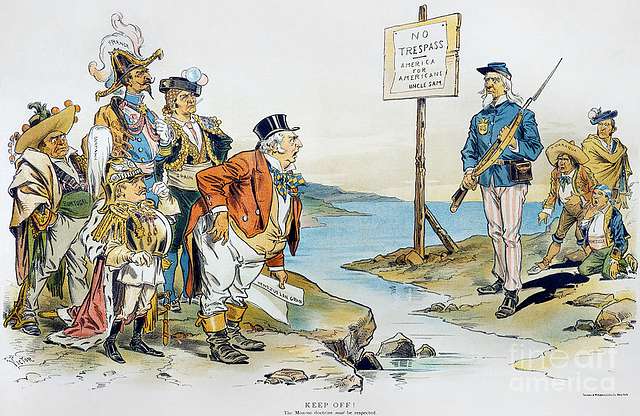
President Monroe said:
“We owe it, therefore, to candor and to the amicable relations existing between the United States and those powers to declare that we should consider any attempt on their part to extend their [free trade -ed.] system to any portion of this hemisphere as dangerous to our peace and safety. With the existing colonies or dependencies of any European power we have not interfered and shall not interfere. But with the Governments who have declared their independence and maintain it, and whose independence we have, on great consideration and on just principles, acknowledged, we could not view any interposition for the purpose of oppressing them, or controlling in any other manner their destiny, by any European power in any other light than as the manifestation of an unfriendly disposition toward the United States.”
Secretary of State Marco Rubio echoed this J.Q. Adams sentiment in a recent op-ed in the Wall Street Journal. Here are some of the critical excerpts:
“Yet even when circumstances demand toughness, the president’s vision for the hemisphere remains positive. We see a prosperous region rife with opportunities. We can strengthen trade ties, create partnerships to control migration, and enhance our hemisphere’s security…
“Relocating our critical supply chains to the Western Hemisphere would clear a path for our neighbors’ economic growth and safeguard Americans’ own economic security.
“Closer relationships with the U.S. lead to more jobs and higher growth in these countries. This reduces incentives for emigration from these countries while providing governments with revenue to fight crime and invest at home…
“This is an approach to foreign policy based on concrete shared interests, not vague platitudes or utopian ideologies. It is representative of the approach the State Department will be taking to all its international dealings. We will extend our hand to all nations of goodwill, in the confident expectation that they will recognize what we can do together.
“Thankfully, the Western Hemisphere harbors more congruent interests than conflicting ones. Making America great again also means helping our neighbors achieve greatness. The threats Mr. Trump was elected to stop are threats to the nations of our hemisphere as well.
“We share a common home. The safer, stronger and more prosperous that home becomes, the more all our nations stand to benefit. Together, there are few limits to what we can accomplish.”
Grenell serves as a special envoy deployed on behalf of President Trump personally, and deployed to Venezuela in part to ensure the acceptance of Venezuelan gang members and illegal migrants deported from the United States. President Trump later reported President Maduro agreed to accommodate this. The relations between the U.S. and Venezuela are the worst in the hemisphere, and currently there is no diplomatic deployment from the U.S. to Venezuela.

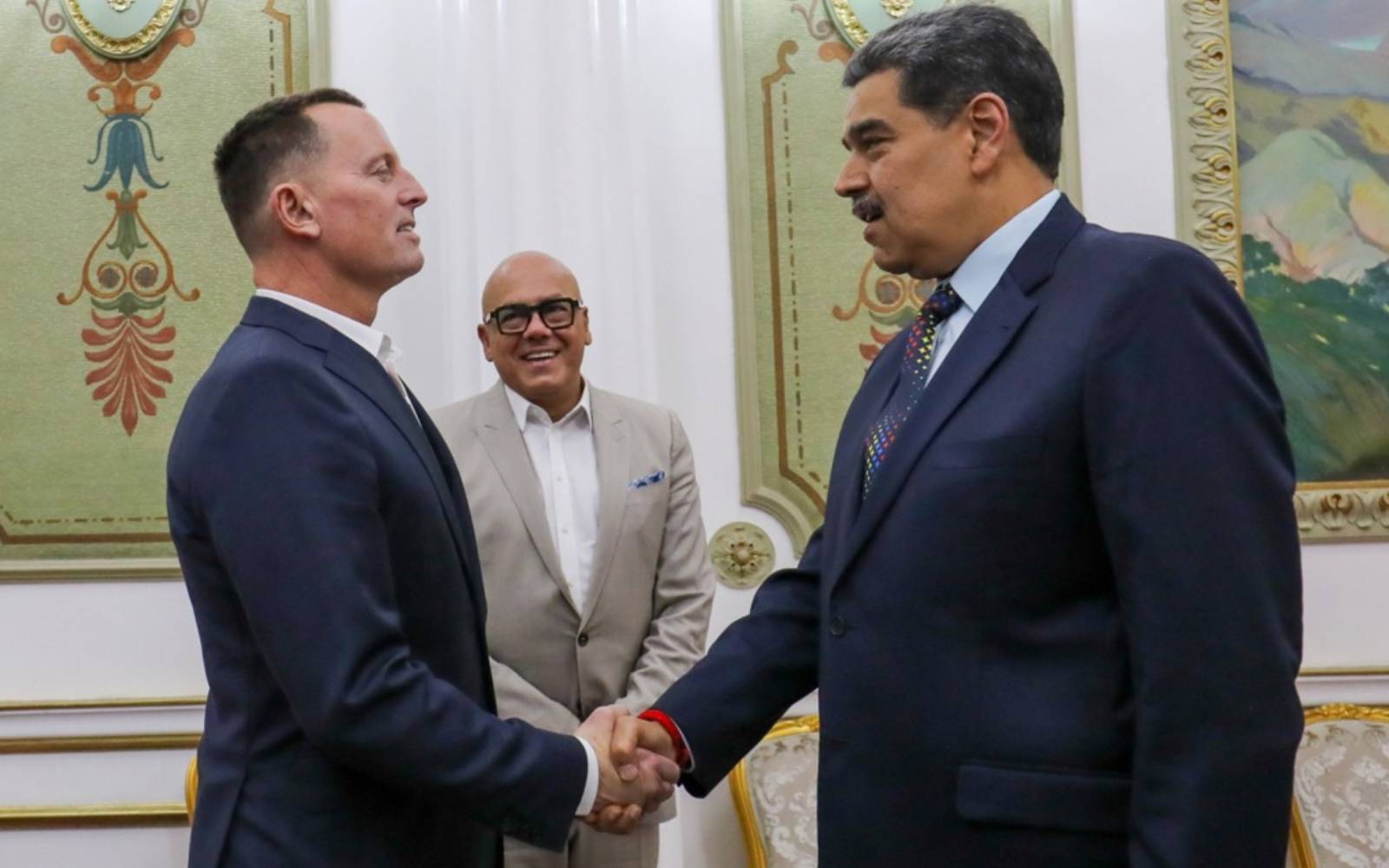
"The US President told reporters he wanted to ‘do something with Venezuela,’... " (though he presented common caveats -ed.)
"Maduro said in an annual speech to the judiciary late on Friday evening that the meeting with Grenell had yielded some initial deals and he looked forward to ‘new deals for the good of the two countries and the region,’" according to Reuters.
"President Donald Trump, we have made a first step, hopefully it can continue," Maduro said.
The visit by Grenell to Venezuela is yet another signal that the United States is once again rejecting globalism and the "rules-based international order," and returning to a foreign policy based on the national interest and the sovereignty of nations.
With the death of free trade and the globalist agenda, the United States is free to pursue its own destiny, as are all nations.
The "new world order" envisioned by President Trump is a world of strong, sovereign nations working together for their mutual benefit. It is a world based on the principles of the American System, a system that has made the United States the most prosperous and powerful nation in history.
The era of free trade and globalization is over. The era of national sovereignty and prosperity has begun.
Get our free newsletter. Zero Spam.